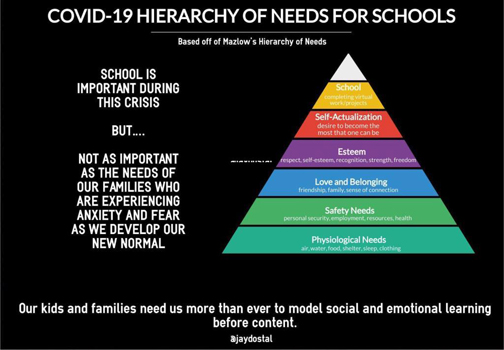|
Give Grace, Less is More
By Diana Patton
Guest Column
Are you a parent feeling in over your head, literally
drowning with the amount of work that your kids are trying
to complete, while still transitioning to online or at-home
learning, balancing a full-time job, and taking care of your
family? Are you in crises, trying to make ends meet because
you are out of a job? Do you lack the necessary tools to
even transition to online learning?
Whew, that’s a lot just writing it, much less living it.
Seriously, I can’t imagine what you are feeling right now,
but I can certainly relate. My two college student kids are
home right now, navigating their online learning. But I
remember like it was yesterday - the kids being home for an
almost two-week period because of a blizzard, and they were
receiving “blizzard packs” to do at home. That was a pretty
stressful time for me because I had a full-time job and my
husband was gone most of the time. What started out as fun
quickly turned into dread, frustration, and cabin fever to
the max. |

Diana Patton |
|
That’s as close as I can come to relating to your
experience, and yet, that truly pales in comparison because…
after all… we are living in a freaking pandemic for God’s
sake. That’s just on a whole other level.
So I am writing this article as a plea to all educators,
parents, schools, and students to say give yourself some
grace. Be courteous. These are unprecedented times that
is striking panic in the hearts and minds of everyone. Our
students, parents, educators, our world is in a state of
trauma. This pandemic has caused psychological distress. The
effects are similar to war times and acts of terrorism, and
can have a devastating impact upon people, depending on
their “trauma-load” before this pandemic.
Trauma can impact a person's physical wellbeing, their
emotions, cause a person to act out in harmful ways, lesson
a person’s self-worth, and challenge relationships. Trauma
can even alter a person’s neurological make-up, decreasing a
person’s ability to learn or process problems, causing
difficulty regulating attention and problems with planning
and organization, and difficulty understanding cause and
effect.
The more you know about the trauma, the more you’d agree
that the most important thing we can all do right now is do
what a local parent, Kevin Mullen, suggests, and that is to
ask: “What do our students REALLY need right now to advance
to the next grade?”

I love this graphic that was recently shared on Twitter by
principal Jay Dostal that references Maslow’s hierarchy of
needs. This just puts it all into perspective.
According to the Trauma Sensitive School research, the best
thing educators, schools, parents, and students can do right
now is to give grace to themselves and others, to help one
another feel safe, feel connected, and to share ways to
increase one’s joy, hope and courage.
Here are a few other suggestions:
1.
Adopt the less is more concept:
Educators, instead of transitioning quickly into the full
load of work before the pandemic, perhaps consider reducing
the load for a bit. After all, states like Ohio have waived
state testing requirements for school children this year. If
you are an educator, I highly suggest you speak to your
school leaders about this, and apply this concept to your
students. Parents, if you are struggling, speak to your
school teachers and leaders about this possibility.
2.
Pray and meditate. Gain
confidence and strength by deepening your spiritual
connection with God. Pray and simply say, “God, help me. I
need you right now to control my thoughts, my body language,
my words, and guard my heart.” Repeat that prayer often.
Don’t believe in God? Simply meditate.
Find a quiet room and sit still for five minutes, breathing
deeply and silently while repeating, “I am blessed and I am
able to control my thoughts and my words.” Make this a daily
practice.
3.
Adopt more joy, love, hope, kindness, and compassion.
In life, left unattended, fear, anger, frustration,
cynicism, and disappointment can grow, just like weeds.
In order to have joy, love, hope, kindness and compassion,
you must be intentional, and do things that will feed these
qualities. Learn more by reading my blog
Which Wolf Are You Feeding?
I am cheering for all of us as we journey toward the other
side of this COVID-19 experience. I am confident that by
extending grace and adopting a less is more mindset, we’ll
RISE up better than before.
If you are looking for more resources to stay positive and
hopeful, follow me on social media.
If you are an educator, join the
Educators on the RISE
Facebook page, and sign up there to learn about future
masterminds, courses and workshops.
Diana Patton’s organization, RISE, is an
advocacy program that
implements social-emotional learning and inclusive
and caring practices in
school systems. With the recent upheaval of our
school programs, RISE is on
the front lines, doing everything we can to
provide support and tangible
tools to our educators.
|